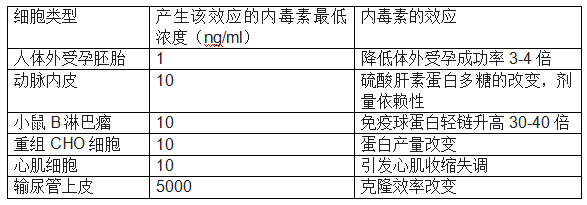 細胞培養(yǎng)進口血清進口胎牛血清進口新生牛血清進口豬血清馬血清
細胞培養(yǎng)進口血清進口胎牛血清進口新生牛血清進口豬血清馬血清 支原體檢測盒及標準品常規(guī)PCR檢測試劑盒熒光定量PCR檢測(qPCR法)支原體DNA提取靈敏度標準品(方法驗證用)特異性標準品(方法驗證用)PCR定量標準品(可用于方法驗證)
支原體檢測盒及標準品常規(guī)PCR檢測試劑盒熒光定量PCR檢測(qPCR法)支原體DNA提取靈敏度標準品(方法驗證用)特異性標準品(方法驗證用)PCR定量標準品(可用于方法驗證) 支原體祛除試劑細胞中支原體祛除環(huán)境支原體祛除水槽支原體祛除
支原體祛除試劑細胞中支原體祛除環(huán)境支原體祛除水槽支原體祛除 干細胞培養(yǎng)基
干細胞培養(yǎng)基 DNA/RNA污染祛除DNA/RNA污染祛除試劑DNA污染監(jiān)測
DNA/RNA污染祛除DNA/RNA污染祛除試劑DNA污染監(jiān)測 RNA病毒研究試劑RNA病毒檢測試劑盒病毒RNA提取
RNA病毒研究試劑RNA病毒檢測試劑盒病毒RNA提取 PCR儀器及配套產品DNA污染監(jiān)測祛除PCR/qPCR儀性能檢查PCR試劑PCR試劑盒PCR預混液(凍干粉)熱啟動聚合酶MB Taq DNA
PCR儀器及配套產品DNA污染監(jiān)測祛除PCR/qPCR儀性能檢查PCR試劑PCR試劑盒PCR預混液(凍干粉)熱啟動聚合酶MB Taq DNA 微生物PCR檢測食品檢測類產品食品微生物檢測細菌PCR檢測
微生物PCR檢測食品檢測類產品食品微生物檢測細菌PCR檢測
- 細胞培養(yǎng)進口血清進口胎牛血清進口新生牛血清進口豬血清馬血清
- 支原體檢測盒及標準品常規(guī)PCR檢測試劑盒熒光定量PCR檢測(qPCR法)支原體DNA提取靈敏度標準品(方法驗證用)特異性標準品(方法驗證用)PCR定量標準品(可用于方法驗證)
- 支原體祛除試劑細胞中支原體祛除環(huán)境支原體祛除水槽支原體祛除
- 干細胞培養(yǎng)基
- DNA/RNA污染祛除DNA/RNA污染祛除試劑DNA污染監(jiān)測
- RNA病毒研究試劑RNA病毒檢測試劑盒病毒RNA提取
- PCR儀器及配套產品DNA污染監(jiān)測祛除PCR/qPCR儀性能檢查PCR試劑PCR試劑盒PCR預混液(凍干粉)熱啟動聚合酶MB Taq DNA
- 微生物PCR檢測食品檢測類產品食品微生物檢測細菌PCR檢測
|
|
內毒素對體外細胞生長和功能的效應2017-07-13 10:38
1984年開始,Case Gould就發(fā)表了一篇關于內毒素對細胞培養(yǎng)效應的綜述1。本文威正翔禹/締一生物為您分析內毒素對體外細胞生長和功能的效應。
針對內毒素的刺激,免疫細胞的表現(xiàn)更為明顯。巨噬細胞和單核細胞已知會產生和釋放各種細胞因子,包括腫瘤壞死因子和白細胞介素等。Morris等人發(fā)現(xiàn),馬腹腔巨噬細胞暴露在低至0.5ng/ml內毒素中6個小時,也可引發(fā)顯著的白細胞介素6產生2。Mattern顯示,100ng內毒素刺激人T細胞增生,產生淋巴因子3。
因此,選用盡可能低的內毒素的胎牛血清,顯然是優(yōu)上之選。 上一篇: 連載:胎牛血清對細胞粘附的影響3
|
 細胞培養(yǎng)進口血清
細胞培養(yǎng)進口血清 支原體祛除試劑
支原體祛除試劑 干細胞培養(yǎng)基
干細胞培養(yǎng)基




